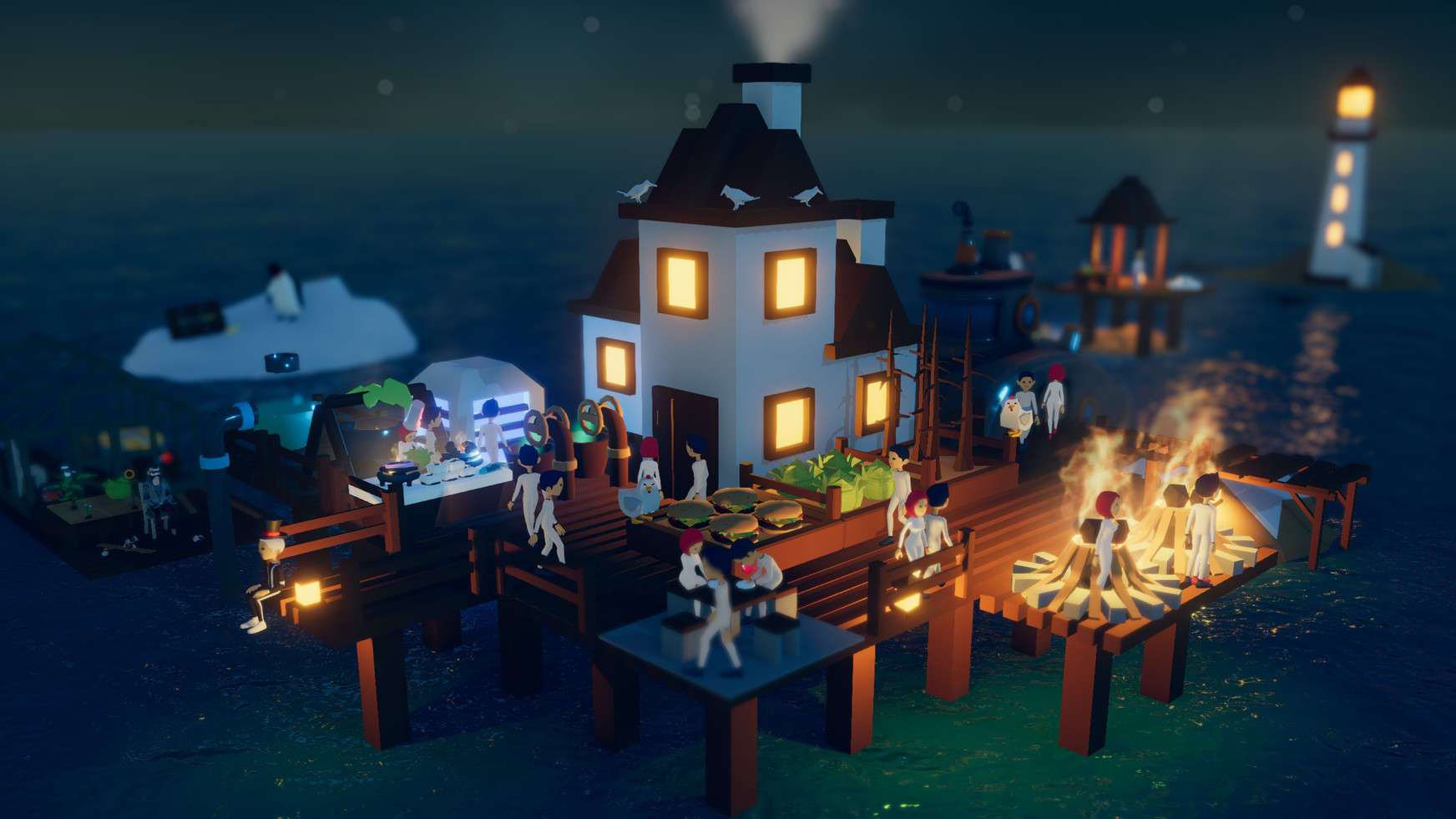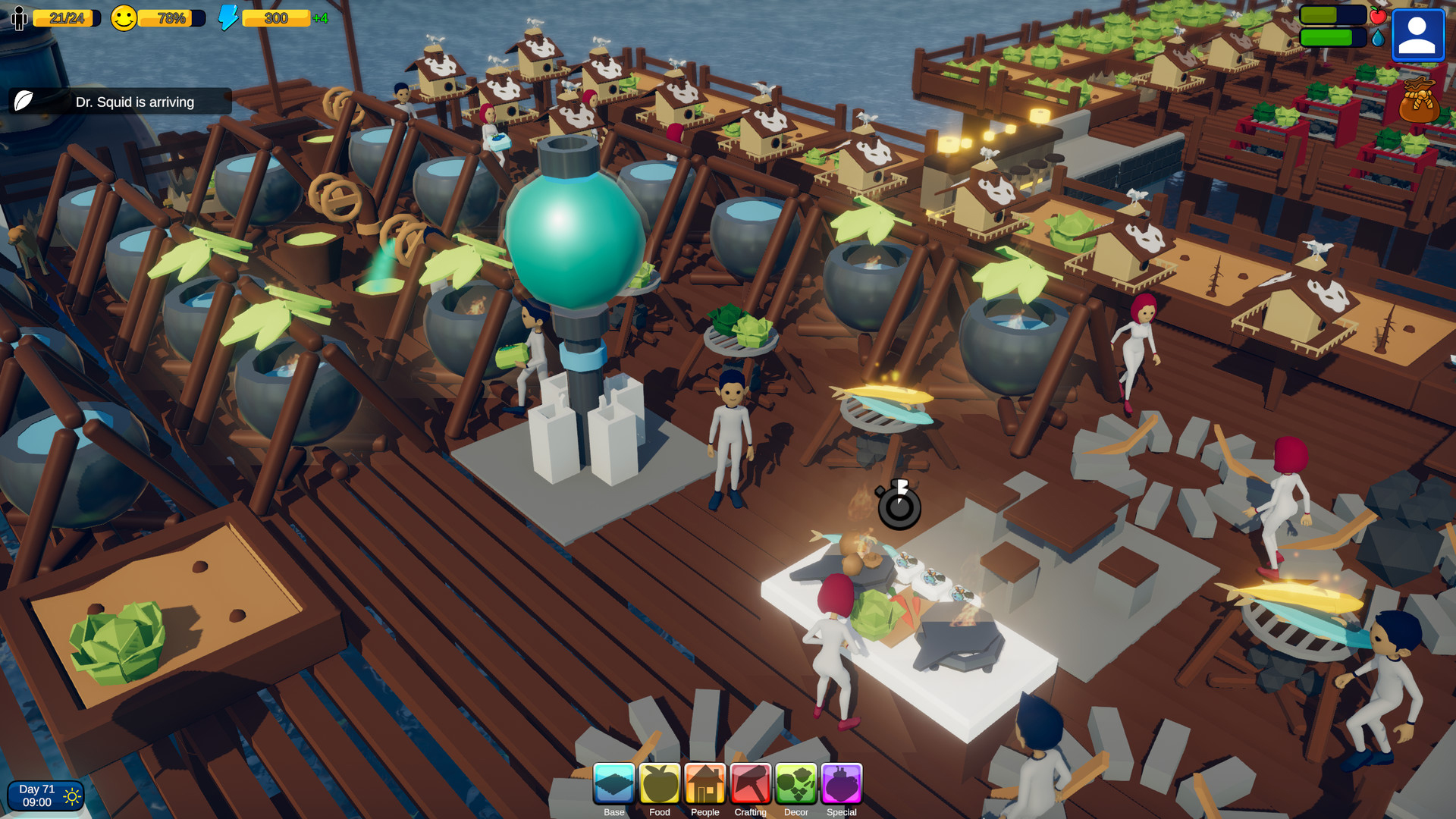This indie colony sim's secret weapon: one-on-one interviews with players about what they like
The team behind Havendock have a more personal approach to community feedback, and are learning new things about how people play their game.

When I first played the demo of colony sim Havendock a couple weeks ago, I was struck by how quickly it hooked me with its charm. It's a game about building a bustling, friendly little town over the ocean: gathering resources as they float by, constructing a dock, setting up crafting stations, and eventually attracting other settlers to join your growing village.
I was surprised to learn that Havendock, which is currently in beta and is planning an Early Access release later this year, is the work of a single developer, Yeo Ying Zhi (aka YYZ). I was even more surprised that Havendock has only been in development for about a year, especially considering how much there was to do in the demo and how well it all worked.
The surprises didn't stop there. While skimming through the updates on Havendock's Steam page, I found an invitation to players to meet with YYZ and members of his publishing team, Pretty Soon, in voice or video chat sessions that could potentially last up to 45 minutes.
Gathering feedback from players in forums, subreddits, emails, or on Discord isn't new, but I'd never heard of a dev offering one-on-one video chats with individual players before. So, I set up my own video chat with YYZ, plus Konrad Wałkuski and Krzysztof Masternak of Pretty Soon, to ask them about it.
The personal approach
Since Havendock is a colony sim with light survival systems, resource management, crafting, and production lines, the publishers were expecting the feedback to focus on the gameplay systems and features. But they quickly discovered players mostly wanted to talk about how they felt while playing the game, rather than about specific systems like farming, building, or automation.
"Sometimes those conversations were quite surprisingly personal."
Krzysztof Masternak, Pretty Soon
"We were kind of approaching this from this kind of strategic, maybe technical perspective," said Wałkuski. "And all of those interviews were really more about the vibe that you're getting as you play."
"Those interviews, those face-to-face conversations with players just allow us to understand their personalities, who they are, why they play games at all," said Masternak. "Sometimes during those conversations they open themselves up, sometimes those conversations were quite surprisingly personal. Sometimes they told us 'I have a lot of stress in my work and [Havendock allows me] to take a deep breath, to sit back, to enjoy, to relax.'"
Keep up to date with the most important stories and the best deals, as picked by the PC Gamer team.
Allowing players to speak at length revealed more than a written feedback form or survey could, the publishers told me, and finding out what their players are getting from Havendock is both useful to YYZ as he develops it and how Pretty Soon should talk about and promote it.

"Even now, we're still kind of a little bit torn when we talk about Havendock," said Wałkuski. "Is this a colony builder? Or maybe is it a bit more of a life sim, where you kind of have more of an emotional experience, rather than a strategic technical experience? And we keep going back and forth on this, hearing [from players]: what are people focusing on? What are they saying? That's where the answer can really come from."
The answer from most of the players they interviewed is that they aren't necessarily trying to build the most efficient colony or min-max production lines, they're just chilling out and losing themselves in the game. One player said they enjoyed playing Havendock while doing other things like watching TV or cooking dinner. Another player unwinds for an hour after work just by catching fish and gathering supply crates as they float by, almost using Havendock as a 'clicker' game, a form of stress relief. Several players compared it to Stardew Valley—not in the core systems but in the chilled-out, relaxing atmosphere.
"It just helps us to understand the player's needs better," said Masternak. "Because we have this comfort that we know the game is great. We know the game is great. We know it is going to be even better than it is right now."
Where we're going, we don't need roadmaps
The unusual method of gathering community feedback fits in with the somewhat unusual development of Havendock itself. For instance, YYZ still isn't entirely sure what the finished game will look like or what features it will include, and he never created a traditional game design document for it.
"In one of our weekly meetings, Krzysztof asked 'What's the vision of the game? What's the roadmap?' And I had a lot of difficulty answering that question," YYZ said. "Because I don't think I have any idea what the final product is going to be because my process is more of an iterative process."
It's the reason why the Discord button in the game is actually almost as big as the play button.
Developer Yeo Ying Zhi (YYZ)
For YYZ, what fans think of the game and want from the game is as important as what he wants. "It's the reason why the Discord button in the game is actually almost as big as the play button," YYZ said. "They're both important, playing the game and being able to build this community and gather feedback, because a lot of the game is actually driven by community feedback in the way that I develop it."
"YYZ does something totally different and counterintuitive even, so he invited players to the game very early," Masternak said. "You can build something for a very long time and keep it hidden in your drawer, or you can just show it to people and see how they react. And from there, you can iterate, you can change it, you can pivot it at some point."

"I launched the game in a very early stage, I think it was just like six or eight weeks. Then I put it up on Itch.io. It was actually very, very buggy," YYZ said. But despite all the bugs present in the game's extremely early state, people kept playing. "And from there my process is mostly iterating with the players, listening to what they want."
"That's one of the reasons why we love the project, because it actually doesn't have a specific roadmap that is set in stone, and we [don't] know exactly what is going to happen," Masternak said. "YYZ's approach from the very beginning, he was very honest and straightforward in that he said, 'Guys, I'm not sure where it is going to end.' So, we embrace it, honestly, and it pretty much depends on the players how the game is going to evolve."
The team plans to continue talking to players one-on-one in the future and they encourage other developers and publishers to initiate the same types of lengthy, personal interviews with the people playing their games.
"We love data. Everyone loves data. And we are interested in numbers [because] that gives us the big picture. But sometimes if you want to really deeply understand a player or just a person, [it's as] simple as that: talk to him or her and try to understand her or his needs," Masternak said. "We are definitely going to repeat [the interview process]. And I will definitely recommend it to anyone."
Portions of this interview have been edited for clarity. Publisher Different Tales is now as Pretty Soon, and this article has been updated to reflect that change.

Chris started playing PC games in the 1980s, started writing about them in the early 2000s, and (finally) started getting paid to write about them in the late 2000s. Following a few years as a regular freelancer, PC Gamer hired him in 2014, probably so he'd stop emailing them asking for more work. Chris has a love-hate relationship with survival games and an unhealthy fascination with the inner lives of NPCs. He's also a fan of offbeat simulation games, mods, and ignoring storylines in RPGs so he can make up his own.


